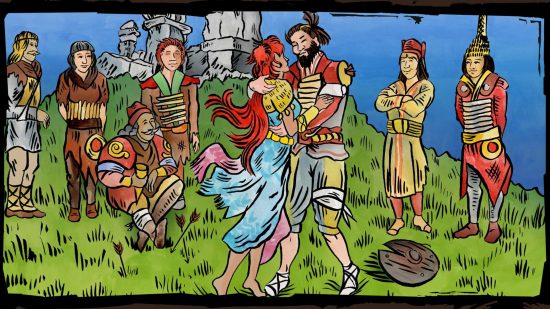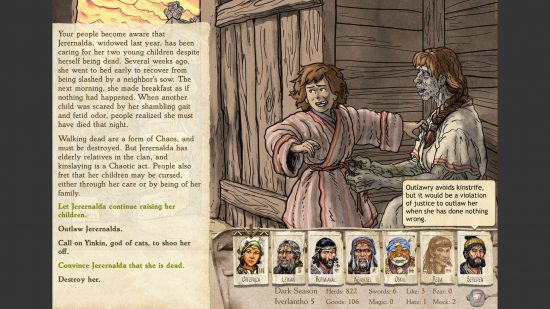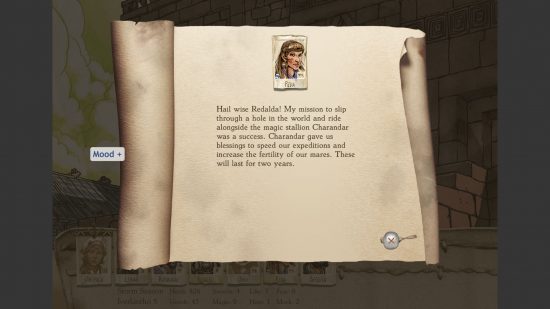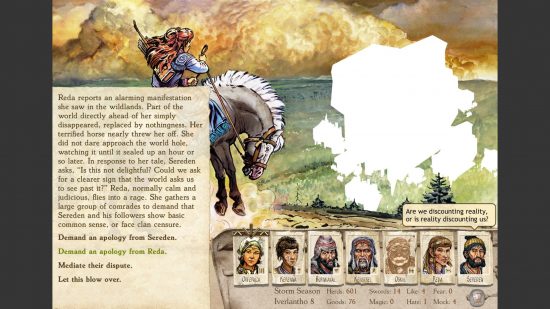Our Verdict
Six Ages 2 is the sort of game that thrives on its own clear formula and the complexities that can lie within. From engaging storytelling to juggling various resources and appeasing the gods, it takes a bucket of simple tasks and ties them all together in a spiderweb of difficult decisions, making the end of the world appear more and more appealing the harder these choices become.
The gods are dead. It doesn’t matter who we sacrifice to – Orlanth, Ernalda, Issaries, Lhankor Mhy – nothing seems to work. One of the clan’s advisors, Orfernza, thinks we should stop worshipping completely, while others suggest keeping up full ceremonies, to ensure their favor if they return. We reduce our temples to them – though the temples aren’t completely dismantled, they could return after all. The omens are ambiguous, though we all know surviving even another year will be tough.
Iverlantho, the next in the royal line (some say the true king), isn’t even on the clan ring, let alone its chieftain. Some royalists among the clan are stirred by this, believing the true king should retrieve the lost regalia, find a wife to supply him with an heir, and regain his position as not only the leader of the clan, but the whole Berenethtelli tribe. Unsurprisingly, no one on the clan ring thinks this is a good idea; after all, it would reduce their power within the clan.
Still, the Genadari clan wanted to make the Berenethtelli a real kingdom again. We sent delegates to help them sway other clans, even though support for it is minimal among the clan ring – and it turns out the other clans are resistant to the idea of any monarchy returning, beyond ceremonial displays. Life is hard enough as it is.
This is the world of Six Ages 2: Lights Going Out. The world is ending, everyone can see it coming, and keeping your clan alive is the priority. Kindly spirits have fled your lands, while baleful chaos monsters descend to slaughter your people and salt your earth. Basically, everything sucks.

It’s a fantastical medieval world developed by Greg Stafford, known as Glorantha, first introduced in 1975. It’s a world where spirits and ghosts play as much of a role as cattle and diplomacy, giving Six Ages a unique feeling among modern strategy titles. A lot of what you do is quite oblique, sacrificing to some oddly named spirit in the hope of a reward which, when it does arrive, offers unclear benefits.
It’s all portrayed via screens – large and gorgeous depictions of the different scenes, with your clan ring, a group of advisors leading the clan, at the bottom to offer advice. There’s a text box with the scene described in concise yet elegant language, and a couple of options at the bottom, leaving the decision to you. It all looks gorgeous on the big screen of my tenth-gen base model iPad, and while it’s all a little tighter on my iPhone, it’s still not cramped. It’s the perfect mobile game, playing as a sort of interactive book for the most part – ideal for any commute.
Six Ages 2 plays out as a sort of amalgamation of modern reference points. There are elements of Crusader King’s random events popping up, adding to your clan’s saga and developing a deepening sense of a reality crafted by how you react to different moments. There are also some resource management elements, though far more obliquely implemented than in other games.
But what it most reminds me of is 80 Days, inkle’s excellent steampunk reworking of the famous Jules Verne novel. While it’s not as literary as that, Six Ages 2 carries twin paths – resource management and choose-your-own-adventure storytelling – into one neat package that I’ve only seen rarely; maybe also in Opus: Echo of Starsong.
All the reference points I have for it, however, reveal my ignorance – and perhaps my age. Six Ages is the second sequel to King of Dragon Pass, the 1999 strategy that came to mobile a few years back, leading to the sequel Six Ages, and then this third entry. These games are all incredibly similar, just taking place in a different part of Stafford’s word. Six Ages 2 isn’t some spiritual successor, it’s just a sequel. And while I know very little about King of Dragon Pass, I’m certain I would love it, just by how much Six Ages 2 has enamored me.
Whether it’s a horde of monsters descending on your village – not to attack, but rather to warn you of an incoming Chaos attack – or the strange robes of a river tribe appearing at your gates and asking for shelter, everything in Six Ages 2 is unclear. Your clan ring can advise you, but you make the final decision. This is the choose-you-own adventure segment; deciding the direction of your clan by reacting to various situations. This is fun for two reasons: you get to choose what you’re doing, and you get to read about it, which is always interesting.
Of course, these examples are from just one playthrough of Six Ages 2, and any other playthrough may bring about different challenges, new faces, or terrible disasters. On my current playthrough, Sentinels discovered a grate in the cellar of our citadel. Dwarves used it to install a sinister device. We attacked, under the recommendation of Irvelantho, now clan chief, but the dwarves slew everyone we threw at them. After tinkering some more with their device, they went down the shaft, and the device began to hum. We detected a terrible stench. A crimson gas filled the citadel. It filled the lungs of the people in the citadel, killing 23 and sickening as many more. I guess I made the wrong choice.
Your decisions aren’t just part of these story segments, however. In between events, there are many different systems to manage. You have to keep your clan happy and healthy, forage and hunt to keep up food supplies, manage your herds and goods for trading and emergency sustenance, explore various bits of the map, send emissaries to unfriendly clans to keep them on-side, raid other clans if you’re not a fan of them, send out trading caravans to balance out your supplies, and sacrifice to the gods and spirits to give all these ventures a chance of succeeding.
Now, it’s all a bit odd if you’ve never delved into this world before, and getting your head around everything will take one full playthrough. When you first start the game, even with the excellent tutorials, you’re encouraged to make decisions to further the story, rather than making decisions hoping it’s the correct one. In reality, there is no correct decision to make – only the decision you want.
And that’s where the magic lies in Six Ages 2: the storytelling. None of these systems are particularly engaging, except until they alter the direction of your tale. You make a blessing to help sow more at the next harvest, yet this brings the good spirits away from a neighboring clan to yours. After a little while, the neighbor realizes and sends delegates to insist on compensation. If you refuse, this could lead to years of war and raids with your neighbor, yet if you accept, you may reduce your herds to a critical level and thus the morale of your people. Every decision is interesting, not just because of what it may lead to, but also because of what led to it.
If you’re a fan of Six Ages 2, check out our Opus: Echo of Star Song review for something similar mechanically, but worlds apart in its storytelling. Alternatively, we’ve also got our Civilization VI tier list and Civilization 6 secret societies guide for all you strategy nuts out there.



